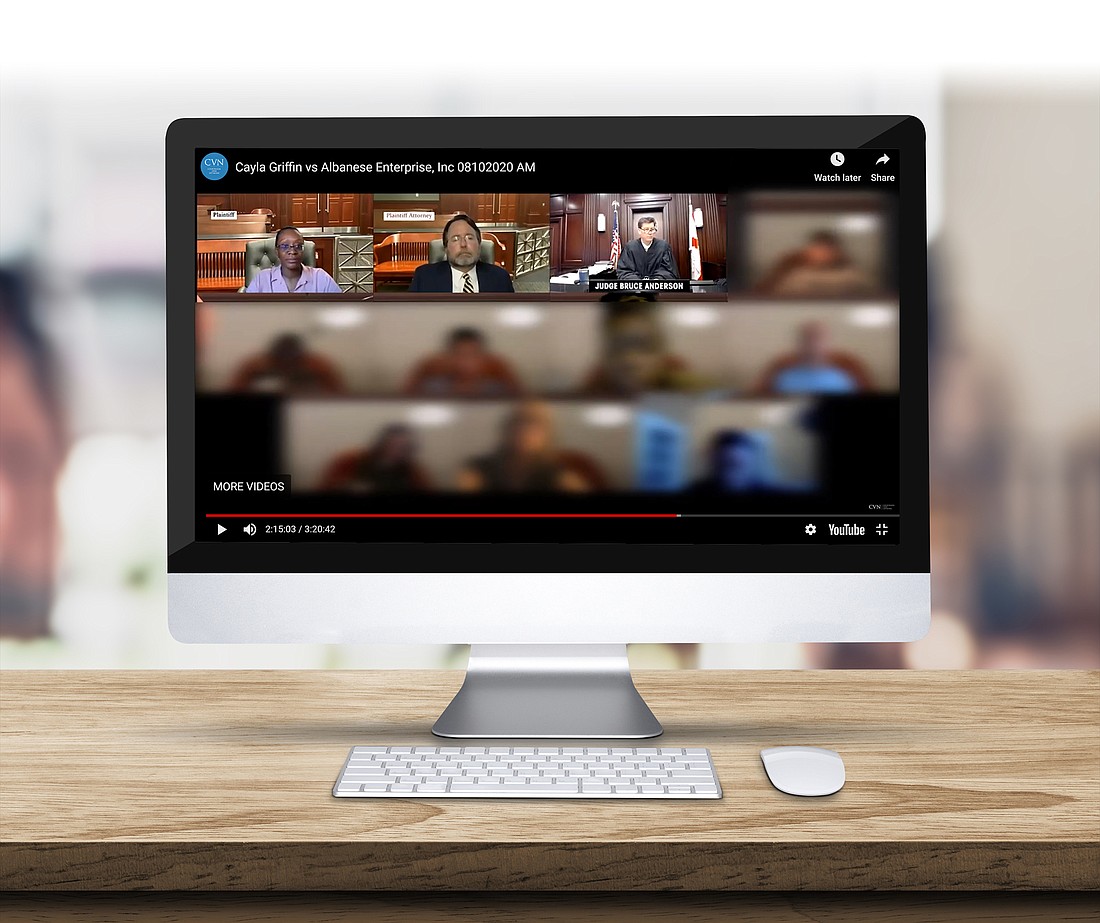
The first civil trial with a jury and binding verdict in the U.S. since the pandemic began ended at about 5:45 p.m. Aug. 10 when the jury’s $354,833 award was read into the record at the Duval County Courthouse.
Jury trials were suspended in mid-March to slow the spread of COVID-19. Through their service, the jurors in the remote trial “brought the sound of justice back to the courthouse,” said presiding Circuit Judge Bruce Anderson.
The case, Cayla Griffin v. Albanese Enterprise Inc., d/b/a/ Paradise, a gentleman’s club, was filed in February 2019.
Griffin, a dancer at the now-closed club, claimed she was assaulted a year earlier by two club bouncers after a dispute over whether she had been fired the night before.
She presented evidence of broken bones and teeth, lacerations and a concussion and that she suffered pain and mental anguish.
Griffin was represented by Matthew Kachergus with Sheppard, White, Kachergus & DiMaggio.
A default judgment was entered against Paradise before Griffin’s case was heard and the defendant chose not to participate in the trial. The jury was empaneled solely to determine the award for damages.
Of the 54 jurors examined Aug. 6-7, six were selected along with two alternates. The one-day trial began at 9 a.m. Aug. 10.
After the opening argument, hearing testimony from two witnesses and the closing argument, the verdict was read shortly before 6 p.m.
Preparing for trial
The key to making the remote trial process work was adapting the Florida Rules of Court Procedure to meet the specific challenges involved in the virtual environment.
That began in May, when the state Supreme Court established a task force to develop a pilot program to help transition the courts to the online space.
The 4th Judicial Circuit was one of five selected to participate.
While the other participating circuits considered a hybrid format – selecting a jury remotely but having the trial in the courthouse – Anderson said that he and Circuit Judge Waddell Wallace decided to pursue a purely virtual proceeding.
The concept duplicates the atmosphere of the courtroom even though only the judge is in the courthouse. Attorneys and their clients may appear via Zoom from their law offices and the jurors are at their homes or where they work.
The 4th Circuit’s technology team, led by Chief Technology Officer Mike Smith, created virtual versions of all aspects of a trial, from the jury box and jury room to sidebar conferences. Paper forms were converted into electronic documents that could be signed and submitted to Anderson, who printed them on the bench to be filed in the record.
After the format was established, mock jury selections and trials began in June with the assistance of the Jacksonville Chapter of the American Board of Trial Advocates and the Chester Bedell Inn of Court.
Jacksonville ABOTA President Corrine Hodak worked on the mock proceedings and served as special magistrate for the remote jury selection and trial.
“We wanted to try to push Zoom until it broke and then find a workaround. We overcame the issues that came up during the mock trials,” Anderson said.
A new way to proceed
Having remote participants on a computer screen instead of in the courtroom meant making some changes while preserving every aspect of an in-person trial.
During jury selection and the trial, Anderson asked each party numerous times if they could see and hear him. Each was provided a telephone number for direct communication with court technology specialists designated as remote bailiffs in case jurors experienced issues with access to the proceedings.
The bailiffs moved the jurors in and out of the remote jury room, just as they would in court. Sidebar conferences were conducted, just as in court.
The remote trial also provided some lighthearted historic courtroom moments. Before a recess during jury selection, Anderson told the prospective jurors they had 10 minutes to “get a cup of coffee or put a load of laundry in the dryer.”
After the verdict
“It’s a brave new world for me,” Kachergus said after the trial.
He said working with the technical elements of the trial while advocating for his client made the process “a little cumbersome,” but until COVID-19 is no longer an issue, remote proceedings will be necessary.
Anderson said the trial would not have been possible without the work of Smith and the court technology staff. He also cited the integrated technology in Duval County’s courthouse and described it as “built to take us into the 21st century.”
“We’re learning as we go along, but it felt like a real trial. It looked like a real trial,” Anderson said.
The recording of the trial will be reviewed by the state Supreme Court. Each juror will fill out a survey questionnaire about their remote trial experience that also will be reviewed by the Supreme Court.
Anderson said attorneys have become used to using Zoom for depositions and even certain hearings, but some may be skeptical about remote trials.
“My hope is that many lawyers will watch the free broadcast on CVN,” he said.